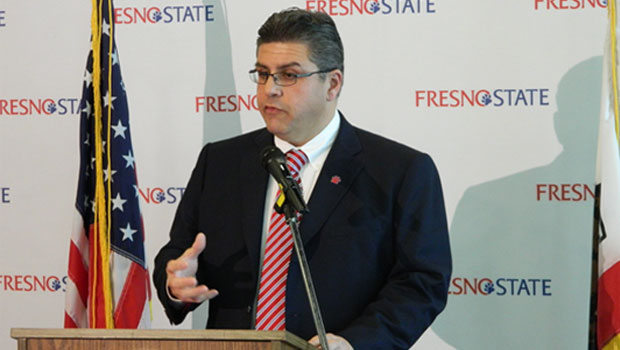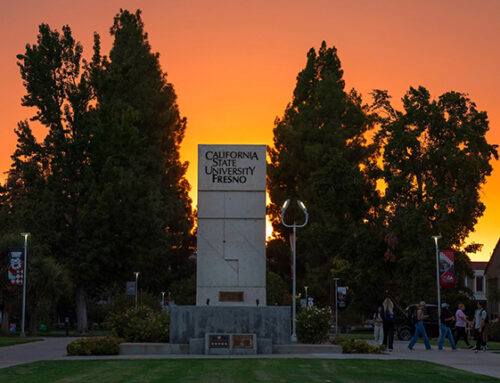Fresno State President Joseph I. Castro spent his first 100 days in office listening and learning about the university and its relationship to Central California and said Friday he’s now identified areas in which he wants to move ahead.
At a press conference on campus, Castro said being president since Aug. 1 has been “the most exciting personal and professional challenge of my life.”
As part of his learning curve, he has made a point to get out and about. “I have met many hundreds of people across the Valley, state and nation. I have walked across the entire campus, visited farms, museums, places of worship, homes, Capitol Hill, football stadiums and many other places locally and beyond.”
Now, Castro said, he is ready to work on initiatives focused on “ensuring that Fresno State will be an even stronger university for the next generations of students and families.”
The initiatives he announced are:
- Launch of phase one of a tablet computer initiative in fall 2014. Students at the undergraduate and graduate level will have the opportunity to learn using the latest tablet technology in disciplines that span across all colleges at Fresno State. The tablets will ensure that students have access to the valuable tools needed to help them succeed and graduate in a timely manner.
- Completing national searches and filling two key leadership positions in 2014: Provost and Vice President for Academic Affairs; Vice President for Student Affairs.
- Creation of a Presidential Commission on the Future of Agriculture. Co-chaired by dairy farmer and industry leader George Soares of Hanford and Fresno State Interim Provost Andrew Hoff, it will include agribusiness and industry leaders from throughout the Valley, plus university representatives. Castro has asked members to assess industry needs and make recommendations to him regarding how Fresno State’s agricultural programs – defined to include intersections with science, math, engineering, business and other areas – can be among the very best in the nation and world. (See commission charge and membership at end of release.)
- Establishment of a campus Task Force on Organizational Engagement that will make recommendations to Castro in 2014 regarding new strategies to enhance support for faculty and staff. “Our people are our most vital asset. We will invest in them, their development and success,” he said.
- Upgrade of the campus infrastructure, which Castro called “my most urgent non-academic priority.” Using over $31 million in funding from the CSU Chancellor’s office, upgrades will be made to IT and electrical infrastructure – much of which has been in place since the 1950s – over the next two years.
- A comprehensive review of athletics at Fresno State, done in collaboration with the Athletic Department. It will lead to decisions next year regarding men’s and women’s athletic teams. As part of that review, Castro will explore the re-establishment of a men’s wrestling team, which he said, “will require a significant investment of private funding by those in the community who want to see this become a reality.”
As he said in his first press conference as president, Castro reiterated that he believes the university’s future is very bright. And, he said, “Because our future is bright, so is the future of this great Valley.”
President’s Commission on the Future of Agriculture
Co-Chairs
George Soares
Andrew Hoff
Members
Darius Assemi
Kim Ruiz Beck
Barry Bedwell
Carol Chandler
Dennis Nef
Octavia Diener
Susan Elrod,
Ryan Jacobsen
David Mas Masumoto
Marvin Meyers
Ram Nunna
Dennis Parnagian
Pat Ricchuiti
Mario Santoyo
Bill Smittcamp
Peter Weber
Lynn Williams
Charge:
Agriculture is the leading industry in the nation’s most populous state – California. The Central Valley is the top-producing agricultural region in the nation and world. Fresno State is located at the epicenter of this vibrant region and has a world-class viticulture program. Other agricultural programs are well-positioned to be among the best in the nation.
The President’s Commission on Agriculture will:
- Review Fresno State’s academic, applied research and public service programs that are focused on agriculture and/or serve the needs of the agricultural industry;
- Identify areas of opportunity where Fresno State’s agricultural programs and facilities can be among the best in the nation; and
- Recommend strategies to strengthen partnerships between Fresno State, government agencies, private foundations, individual philanthropists and the agricultural industry in support of the campus’ agricultural programs.
The Commission will meet, as needed, to conduct its work. Staff support will be provided to the Commission. The Commission will produce and submit its initial report to President Joseph Castro by May 1, 2014.





